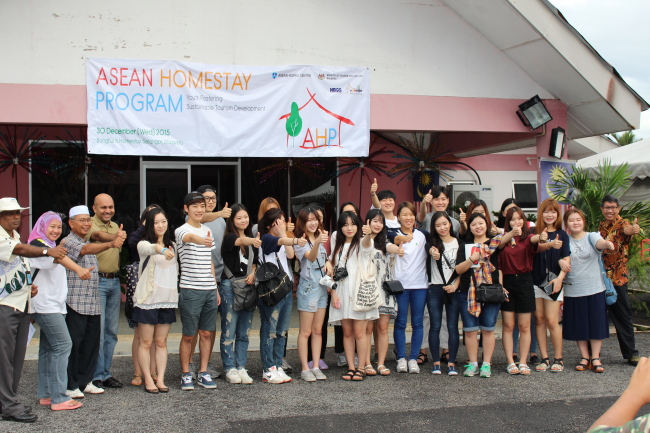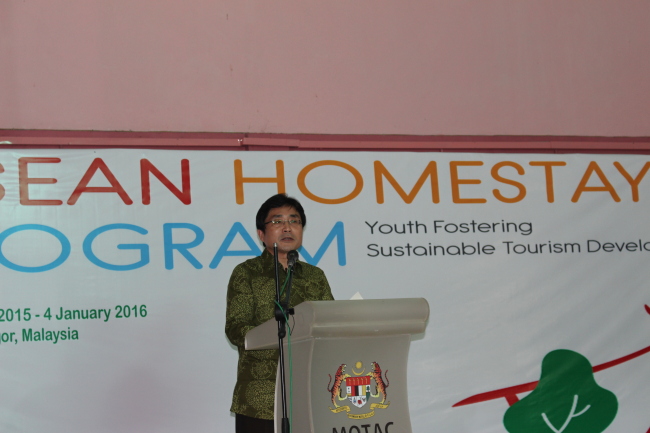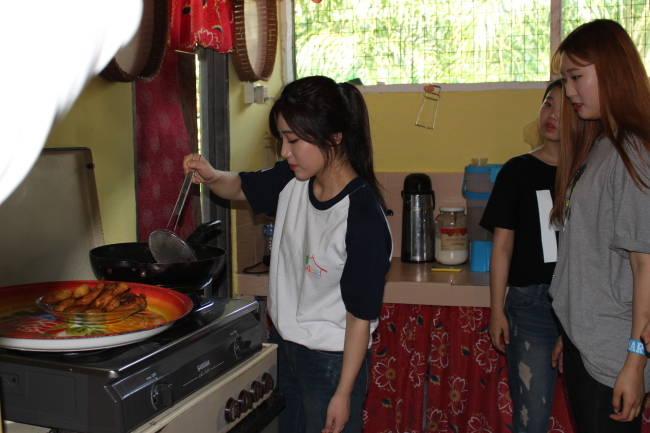Diving into village life in Malaysia
Student homestay program by ASEAN-Korea Center offers glimpse at lives of ASEAN nation communities
By KH디지털2Published : Jan. 12, 2016 - 15:00
BANGHURIS, Malaysia -- At a remote village in the state of Selangor, Malaysia, a bus pulls over to unload a group of Korean youth in their teens and 20s.
They are greeted by a group of locals playing their traditional music and the sounds of beating drums, as expressions on the Koreans’ youthful faces vary between gleeful, excited and even a little confused at the exotic welcoming ceremony.
They are greeted by a group of locals playing their traditional music and the sounds of beating drums, as expressions on the Koreans’ youthful faces vary between gleeful, excited and even a little confused at the exotic welcoming ceremony.

The 20 students -- majoring in tourism or Asian studies at seven universities located in Seoul and Busan -- are participants in an eight-day pilot homestay program for university students jointly organized by the ASEAN-Korea Center and the Ministry of Tourism and Culture in Malaysia that ran from Dec. 28-Jan. 5.
“The experience starts from the moment you get off the bus,” said Muhamad Daud Muhamad Arif, the head of the culture and tourism unit at the ASEAN-Korea Center.
A country of rich culture, unique traditions and beautiful scenery, Malaysia tallied 27.4 million tourists in 2014 and the United Nations World Tourism Organization listed it as the 10th most visited country in 2012.
But Daud, a native of Malaysia himself, says the program offers more than just tourism. “It’s not about the accommodations or the programs; it’s about what you experience during the time here,” he pointed out.
AKC secretary general Kim Young-sun said the objective of the program is to provide a stage for Korean students to interact with “sustainable community-based tourism” products in the Association of Southeast Asian Nations. Community-based tourism refers to tourism experiences developed to promote tourism and the industries of local communities.

Kim said one of the biggest hurdles in the establishment of the ASEAN community is the gap between the development of regions, which is why Malaysia and the AKC devised the program to propel the growth of regional industries and tourism.
“I strongly believe that this ASEAN Homestay Program would be an excellent platform to complement the vision of ASEAN by promoting the bloc’s cultural awareness and reinforcing the understanding of Korean students of its unique cultural identity,” he said.
According to Kim, Malaysia’s strong homestay programs motivated officials to choose it as the partner for the pilot program. There are a total of 181 homestays in Malaysia at more than 3,600 houses, receiving nearly 300,000 tourists from inside and outside the country.
Datuk Mas Ermieyati Samsudin, Malaysian tourism and culture deputy minister, said the homestay segment currently contributes roughly 1 percent to overall tourism revenue in the country.
If the program goes well, the AKC plans to expand the joint homestay project to all ASEAN countries.
Kim, a career diplomat and previously Seoul’s envoy to Indonesia, stressed that understanding another country’s culture, history and social norms is crucial to truly comprehending that country.
“If we look at foreign cultures based only on our own perspective, the relationship cannot be beneficial to either sides. By participating in activities, respecting the other culture, students will have a chance to become a ‘truly global’ citizen,” he said.
Understanding of foreign culture is not confined solely to Korean students. On the second day of the trip, students had a chance to mingle with freshmen from Universiti Kuala Lumpur and share their common passions for various subjects, including the increasingly popular K-pop.
Students from the two countries also jointly planted trees, tapped rubber from trees, fished and even dressed up for a traditional Malay wedding ceremony, in which two students from each side partook in a mock ceremony.

According to the AKC, the program aims to give students a better understanding of community-based tourism through hands-on experiences related to local culture, environment conservation and sustainable tourism policy development.
Students said the most impressive aspect of the program was staying with locals.
“When I went to study in the U.S., I was assigned to a dorm with Korean students, and I couldn’t befriend Americans if I didn’t really try. But here, I get a chance to be close to locals because I share a house with them,” said Choi Eun-ji, a 23-year-old attending Dongseo University.
Host families are one of the most important aspects of the homestay programs, and Arshad Mustapa -- the state director of the ministry of tourism and culture, Selangor office -- said he pays special attention to who hosts the foreign guests.
"We make sure that the family is free from any sickness and that they have modern facilities, clean water, adequate power supply, hygiene and no insect infestation around the houses,” he said. The host families are also subject to regular inspections every six months, and they receive foreign language classes to acquire basic communicative capacity.
Shin Hyung-seok, a 19-year-old from Sejong University, said the homestay program was a step up from his backpacking trip in Malaysia this summer, mainly because it showed them an authentic experience of what it was like to live among people of a different culture.
“Back then, they sold beer everywhere I went. So I didn’t really get a feel that it was a largely Islamic country,” he said. Alcohol is prohibited in the Islamic religion.
“But here, in addition to no beer, I see people being careful about even shaking hands with women. That had me think, ‘this is the real Malaysia,’” he said.
As part of the program, participants are given assignments to develop novel ideas to enhance the tourist experience based on their time there. In addition, they are required to post photos and videos on their social media accounts, with the most outstanding candidate receiving a certificate and an opportunity for a short-term attachment at the AKC.

The program also divulged some points of improvement. Jeong Min-ji of Kyung Hee University said the program should offer even more activities to offer more chances to experience legitimate Malaysian life.
Jung’s schoolmate Jeon Hee-won agreed, saying her most memorable time was at homes with locals.
“When we were at home, we cooked local food and talked with our host families,” she said.
Jeon also expressed her hope that the program would offer more chances that would get Korean students to better understand and become close friends with their Malaysian counterparts, rather than simply participating in arranged activities together.
By Yoon Min-sik (minsikyoon@heraldcorp.com)











![[Hello India] Hyundai Motor vows to boost 'clean mobility' in India](http://res.heraldm.com/phpwas/restmb_idxmake.php?idx=644&simg=/content/image/2024/04/25/20240425050672_0.jpg&u=)







